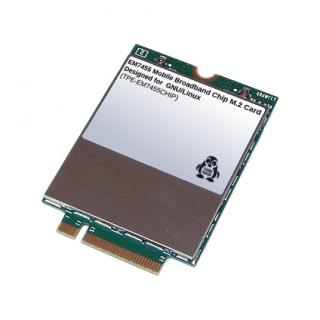4G EM7455 Mobile Broadband M.2 Card for GNU/Linux (TPE-EM7455CHIP, Europe)Get the best GNU/Linux supported M.2 4G LTE-Advanced modem on the market today. With our 4G LTE-Advanced Modem, connecting to the Internet is easy. Just plug it in, run your distribution's Mobile Broadband connection wizard, and surf. It's genuinely Penguin friendly with all recent desktop oriented GNU/Linux distributions supported out of the box.
This modem is primarily intended for users outside of North America and customers of Sprint within the United States. This item always ships from the United States regardless of shipping method selected and does not included VAT/taxes in the advertised price. Expect to pay taxes/duties on delivery where applicable. Partial List Of Supported Releases:Trisquel 9+ Parabola GNU/Linux 2019.03.10, 2020.01.18, 2020.01.22, 2020.08.02, 2020.08.03, 2020.09, 2021.08.11, 2022.04, 2024.02 Ubuntu 15.10, 16.04, 16.10, 17.04, 17.10, 18.04, 18.10, 19.04, 19.10, 20.04, 20.10, 21.04, 21.10, 22.04, 22.10, 23.04, 23.10, 24.04, 24.10, 25.04, 25.10 Lubuntu 15.10, 16.04, 16.10, 17.04, 17.10, 18.04, 18.10, 19.04, 19.10, 20.04, 20.10, 21.04, 21.10, 22.04, 22.10, 23.04, 23.10, 24.04, 24.10, 25.04, 25.10 Peppermint Linux OS 7, 8, 9, 9 Respin-2, 10, 10 Respin, 10 Respin 20191210, 2022-02-02, 2022-10-02, 2022-11-07, 2022-11-28, 2023-07-01, 2023-10-15, 2024-07-01, Bookworm/Daedalus, Trixie Kubuntu 15.10, 16.04, 16.10, 17.04, 17.10, 18.04, 18.10, 19.04, 19.10, 20.04, 20.10, 21.04, 21.10, 22.04, 22.10, 23.04, 23.10, 24.04, 24.10, 25.04, 25.10 Debian 9, 10, 11, 12, 13 Devuan GNU+Linux 2, 3, 4, 5, 6 Linux Mint 18.3, 19, 19.1, 19.2, 19.3, 20, 20.1, 20.2, 20.3, 21, 21.1, 21.2, 21.2 Edge, 21.3, 21.3 Edge, 22, 22.1, 22.2, 22.3 Linux Mint Debian Edition (LMDE) 3, 4, 5, 6, 7 Fedora 26, 27, 28, 29, 30, 31, 32, 33, 34, 35, 36, 37, 38, 39, 40, 41, 42, 43 OpenSuSE 42.2, 42.3, 15.0, 15.1, 15.2, 15.3, 15.4, 15.5, 15.6, 16.0 Mageia 6, 6.1, 7, 7.1, 8, 9 CentOS Stream 8, 9, 10 CentOS 8 Series 8.0, 8.1, 8.2, 8.3, (discontinued) Red Hat Enterprise Linux (RHEL) 10 Series 10.0, 10.1 Red Hat Enterprise Linux (RHEL) 9 Series 9.0, 9.1, 9.2, 9.3, 9.4, 9.5, 9.6, 9.7 Red Hat Enterprise Linux (RHEL) 8 Series 8.0, 8.1, 8.2, 8.3, 8.4, 8.5, 8.6, 8.7, 8.8, 8.9, 8.10 Rocky Linux 10 Series 10.0, 10.1 Rocky Linux 9 Series 9.0, 9.1, 9.2, 9.3, 9.4, 9.5, 9.6, 9.7 Rocky Linux 8 Series 8.4, 8.5, 8.6, 8.7, 8.8, 8.9, 8.10 AlmaLinux 10 Series 10.0, 10.1 AlmaLinux 9 Series 9.0, 9.1, 9.2, 9.3, 9.4, 9.5, 9.6, 9.7 AlmaLinux 8 Series 8.3, 8.4, 8.5, 8.6, 8.7, 8.8, 8.9, 8.10 Arch 2019.03.01, 2019.04.1, 2019.05.1, 2019.06.1, 2019.07.1, 2019.08.1, 2019.09.1, 2019.10.1, 2019.11.1, 2019.12.1, 2020.01.1, 2020.02.1, 2020.03.1, 2020.04.1, 2020.05.1, 2020.06.1, 2020.07.1, 2020.08.1, 2020.09.1, 2020.10.1, 2020.11.1, 2020.12.1, 2021.01.1, 2021.02.1, 2021.03.1, 2021.04.1, 2021.05.1, 2021.06.1, 2021.07.1, 2021.08.1, 2021.09.1, 2021.10.1, 2021.11.1, 2021.12.1, 2022.01.1, 2022.02.1, 2022.03.1, 2022.04.1, 2022.05.1, 2022.06.1, 2022.07.1, 2022.08.1, 2022.09.1, 2022.10.1, 2022.11.1, 2022.12.1, 2023.01.1, 2023.02.1, 2023.03.1, 2023.04.1, 2023.05.1, 2023.06.1, 2023.07.1, 2023.08.1, 2023.09.1, 2023.10.1, 2023.11.1, 2023.12.1, 2024.01.1, 2024.02.1, 2024.03.1, 2024.04.1, 2024.05.1, 2024.06.1, 2024.07.1, 2024.08.1, 2024.09.1, 2024.10.1, 2024.11.1, 2024.12.1, 2025.01.1, 2025.02.1, 2025.03.1, 2025.04.1, 2025.05.1, 2025.06.1, 2025.07.1, 2025.08.1, 2025.09.1, 2025.10.1, 2025.11.1, 2025.12.1, 2026.01.1, 2026.02.1 Manjaro 18.1.0, 19.0, 20.0, 20.1, 20.2, 20.2.1, 21.0, 21.0.1, 21.0.2, 21.0.3, 21.0.4, 21.0.5, 21.0.6, 21.0.7, 21.1.0, 21.1.1, 21.1.2, 21.1.3, 21.1.4, 21.1.5, 21.1.6, 21.2.0, 21.2.1, 21.2.2, 21.2.3, 21.2.4, 21.2.5, 21.2.6, 21.3.1, 21.3.2, 21.3.3, 21.3.4, 21.3.5, 21.3.6, 21.3.7, 22.0, 22.0.1, 22.0.2, 22.0.3, 22.0.4, 22.0.5, 22.1.0, 22.1.1, 22.1.2, 22.1.3, 23.0, 23.0.1, 23.0.2, 23.0.3, 23.0.4, 23.1.0, 23.1.1, 23.1.2, 23.1.3, 23.1.4, 24.0, 24.0.1, 24.0.2, 24.0.3, 24.0.4, 24.0.5, 24.0.6, 24.0.7, 24.0.8, 24.1.0, 24.1.1, 24.1.2, 24.2.0, 24.2.1, 25.0.0, 25.0.1, 25.0.2, 25.0.3, 25.0.4, 25.0.6, 25.0.7, 25.0.8, 25.0.9, 25.0.10, 26.0, 26.0.1, 26.0.2 Distributions and releases listed above are referencing support for the graphical networking utilities of the primary desktop environment that a distribution or release ships. In some cases earlier releases will also work, but generally not through the standard graphical networking utilities. As such users may want to check out our directions for manually setting up a cellular data connection via the terminal. When using a terminal and manually setting up a connection it may be necessary to have a temporary internet connection to install additional software (libmbim-utils). Mageia users should note that the distribution works with the above chips when using the GNOME desktop environment only after manually adjusting the firewall. Under OpenBSD users may need to setup the connection from the terminal (we haven't tested anything else). Linux Mint users should be aware that we have only verified support under the Cinnamon desktop environment and not any other desktop environments nor any non-Ubuntu based versions. All of this said even if your distribution and release isn't listed most recently released distributions and desktop environments are compatible and will work with the modems using either chip. If you have any questions about which card is right for you and/or compatibility with a particular distribution or release feel free to contact our support team. |

